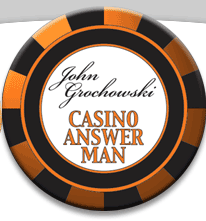I'd met Al before. He'd come to at least one of my seminars, and we
once found ourselves at the final table in a blackjack tournament.
Neither of us won.
So when he called out my name from a blackjack table, I waved and
walked over to say hello. He colored up his chips and said he had
something he wanted to talk about way from the table.
"These MIT guys. They played as a team right?" he asked.
Yes, I told him the story of the MIT card counting team is well chronicled in Ben Mizrich's best seller, Bringing Down the House, and you can learn more about them and their methods at www.blackjackinstitute.com.
"OK, I thought so. Do they or teams like them send out scouts to look
for players? While I'm playing, is someone from a team likely to be
checking me out?"
Unsolicited? Without you knowing them or having approached the team first?
"Yeah. Just them looking for new players."
No, I told him. It's extremely unlikely that a team would be
recruiting people they don't know on such a hit-and-miss basis. A
blackjack team is a business that requires a lot of trust. Members won't
be in a hurry to recruit someone unknown to them.
"That makes sense. I'm just trying to figure out something someone said at the table the other day."
What's that?
"I'd just doubled down, and a guy at the other end of the table said,
'You're not a team player.' And the woman next to him said, 'If you're
going to make plays like that, we don't want to play with you.' And they
picked up their chips and left."
Were you sitting at third base, the last position to take a card before the dealer?
"Yeah, that's right. I like to see all the other cards before I play."
Do you remember the details of the hand? What were you doubling on, and what did the dealer have face up?
"I had an Ace and a 7. The dealer showed a 6. By the book, that's a double down hand, right?"
Yes, it is. Doubling was the right play.
"So why were they so upset? And what's this about a team"
Easy, I told him. Al had encountered a couple with a peculiar mindset
that is not uncommon at the blackjack table. They believe that third
base is a team position at a blackjack table, and that by sitting at
third base, the player agrees to avoid taking the dealer's bust card.
They thought he should have been satisfied to stand on his soft 18
against a 6 instead of doubling down and taking another card --- the
card they thought could be the one to bust the dealer's hand.
"Oh, I should have known," he said, the look of comprehension
spreading across his face. "They wanted me to make bad plays because
they thought it would help the rest of the table. Well, that's dumb."
Sure it's dumb. For one thing, when the dealer has a 6 up, there's no
guarantee he or she has a high enough card face down that it can be
busted with a one-card draw. And even if the dealer does have a high
card face down, there's no guarantee that the next card will be the bust
card. A player who takes a hit at third base --- or, in Al's case,
doubles down --- could just as easily be taking a low card that would
make the dealer's hand.
The problem is that players remember the times a third baseman's hit
takes a high card that would have busted the dealer, but don't remember
the times that the hit takes a low card. They certainly don't remember
the times that going a card deeper into the deck because of the hit
actually causes the dealer to bust. It is just as likely that the third
baseman helps the table rather than hurting it by taking a hit.
But enough players have a bad case of selective memory that they blame the third baseman when things don't go their way.
"So what they're saying is nonsense. Third base is not a team position."
Of course not, unless the others are willing to subsidize your losses
when you make a play you don't want to. I've never yet had other
players offer to make up the difference if I stand on soft 18 instead of
doubling down, or stand on 12 instead of hitting against 2 or 3, or any
of the other odd things they think the third baseman should be willing
to do.
"Somehow I didn't think the MIT guys were looking for people to make
bad plays. I take it that's not the kind of team play they're looking
for."
Not at all. Team play for them involves a card counter letting a big
player know when the situation is right to come in and make large bets.
It does not involve the silliness of avoiding taking a dealer's bust
card.
"I should have known," Al said before returning to the table. "Anyone
smart enough to figure all that out wouldn't expect such dumb plays."

No comments:
Post a Comment